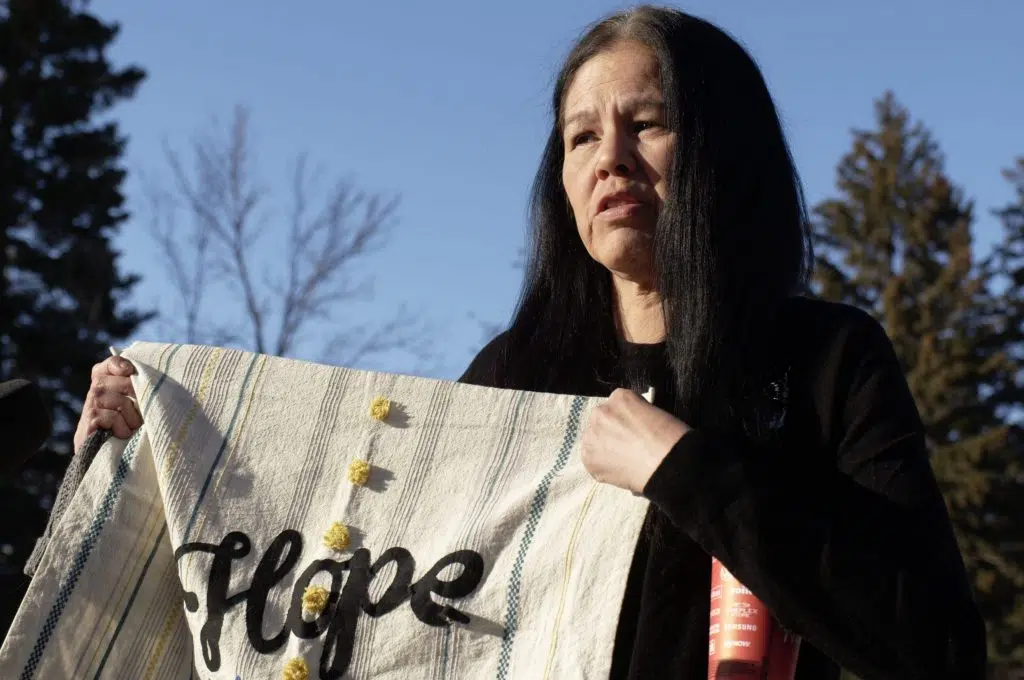It was an emotional day for two sisters released on bail after spending nearly 30 years behind bars, and also for a woman who’s been working for years to help free them.
On Monday, sisters Odelia and Nerissa Quewezance were released on bail pending a review of their 1994 murder conviction.
“I was ecstatic,” said Nicole Porter, a lead criminal consultant and behaviour analyst with N.A. Porter & Associates.
Porter spent years working alongside David Milgaard, a man who spent more than 23 years behind bars after his wrongful conviction in the killing of a Saskatchewan woman. Porter said Milgaard, an advocate in wrongful conviction cases, asked her to become involved in the Quewezance case prior to his death in 2022, so she offered her services pro bono to Odelia and Nerissa.
Porter said she’s spent the past two years working for the women to be freed as a criminal justice and Indigenous rights advocate.
“To see them go home and be free, and be able to interact with family members that they haven’t been able to, and start their healing journey was just absolutely incredible,” Porter shared.
After conducting an independent forensic analysis of the original investigation into the death of 70-year-old farmer Anthony Dolff, which the sisters were convicted of in a 1994 trial, Porter said she concluded through examining trial documents and evidence — including a nationally televised confession by a cousin of Odelia and Nerissa — that the justice system had failed the Quewezance sisters.
“It became very clear to me, very quickly, that there had been a miscarriage of justice,” Porter said.
Porter was also behind a petition that has so far garnered close to 63,000 signatures in support of the release of Odelia and Nerissa. She said the sisters now have supporters across the country.
The justice advocate said she’s been in regular communication with the sisters, and Odelia, in particular, who was already on day parole. Porter, who lives in Ontario, has also been present at some of the Saskatchewan hearings for the sisters, including the original bail hearing in January.
“Having delay after delay was so disappointing. We just wanted an answer after so many years,” Porter said.
“The two of them are just most excited about being able to finally go home,” she added.
Odelia has a husband and twin daughters she will be reconnecting with after a lot of lost time, Porter said.
The court imposed several conditions on the sisters’ release, including requirements they have no contact with the victim’s family or anyone else who was a witness at their original 1994 trial, apart from their own family members.
Porter said the judge determined it was appropriate for the sisters to reconnect with their own family, though they must refrain from speaking about the trial in any way with those who were involved.
The women will also have to abide by a curfew, and Porter said Indigenous organizations have stepped up to help supervise the women in the community as well as support them in obtaining driver’s licences and finding work.
“(Those are) things that most of us take for granted, and for them this is all new,” Porter explained. “It really allows them to go home and start that healing journey.”
The judge also noted his certainty that the women would return to court when necessary, their lack of risk to the public, and the interest by the public in the case and seeing a just outcome.
Now, the sisters will have to wait.
Federal reviews of criminal cases, like the one happening in the Quewezance case, have historically taken up to six years to complete. Porter said with the Quewezance review already nearing a year, she thinks another three years are reasonable to expect, but it could be even longer before a final decision is made.
“At least they can be home for that,” Porter said.
She said the federal justice minister has the power to order a new trial, send the case back to an appellate court, or dismiss the application altogether.
However, after hearing the comments from the judge during the sisters’ bail hearing Monday, Porter said she’s optimistic. She said the judge went so far as to voice his own confidence in the justice minister seeing the case as a miscarriage of justice.
Porter called it “incredible to hear.”
The advocate said she will continue working on the case, and hopes the sisters will eventually be exonerated and receive both an apology and compensation for the significant portion of their lives spent behind bars.
The decision to release the sisters is one that will be relied upon in the future when deciding similar cases, Porter said, calling the case’s progress a positive step for addressing wrongful conviction cases in Canada.











